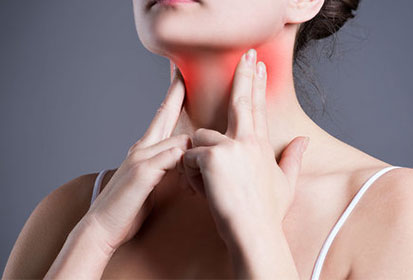In the human body, we have a butterfly-shaped gland in the neck, called as the Thyroid gland. This gland makes the hormones, T3 and T4 which are necessary for the proper functioning of every organ in the body. Any disturbances in the functioning of this gland are reflected in the change in the level of another extremely sensitive hormone called TSH which comes from the pituitary gland.
Hypothyroidism
In hypothyroidism, T3, T4 hormones are low and TSH is high. A person might get symptoms of
- Fatigue
- Weight gain
- Drowsiness, lethargy
- Constipation
- Muscle weakness
- Goitre
- Memory disturbances
- Irregular periods/Infertility
- Hairloss etc

When this hypothyroidism is a result of an autoimmune disease, it is called Hashimoto’s thyroiditis. This is often associated with Anti microsomal antibodies (or Anti TPO antibodies) or anti-thyroglobulin antibodies. Other varieties of thyroiditis include Subacute thyroiditis, postpartum thyroiditis, and Riedl’s thyroiditis.
For the treatment of hypothyroidism, thyroxine sodium is given which is the T4 which our thyroid gland produces normally. So the treatment is simple and pure hormonal. There are no restrictions for food in hypothyroidism as is often misunderstood.
Hyperthyroidism
This is the hyperfunctioning of the thyroid gland, also called Graves’ disease. This is often associated with TRAB antibodies. Increased levels of T3, T4 may cause the following symptoms
- Weight loss
- Palpitations
- Tremulousness
- Goitre
- Irregular periods
- Diarrhea
- Insomnia etc.
In hyperthyroidism, anti-thyroid drugs are prescribed to the patient which reduces thyroid hormone levels and improves symptoms. Contrary to the common belief, anti-thyroid drugs are seldom required for life-long.
Thyroid Eye Disease
The eye changes in hyperthyroid state are classically pained on eye movement, redness or grittiness, and proptosis (the eye-balls popping out). It is important to know the early changes in thyroid eye disease as timely management with intravenous or oral steroids causes a lot of improvement in eye symptoms.
Goitre
The enlargement of the thyroid gland is called goitre. It could occur with hypothyroidism or hyperthyroidism. Sometimes there are nodules in the thyroid gland which need further evaluation to rule out cancer in the thyroid gland. Sometimes nodules can be multiple called multinodular goitre, which needs to be differentiated from iodine deficiency goitre.
Goitre may be small or large. A large goitre that is pressing on the windpipe (trachea) or food pipe (esophagus) needs to be operated otherwise a small-sized goitre can be observed without surgery.
Pregnancy and Thyroid
Thyroid diseases need to be very meticulously controlled during pregnancy, as this may have an effect on the fetus. Even mild forms of Hypothyroidism can be a cause of infertility, through irregular menses and anovulation (absent ovulation). in a pregnant lady, it may cause recurrent miscarriages or mental subnormality of the fetus, etc.
During pregnancy, subclinical hypothyroidism (borderline hypothyroidism) can become overt hypothyroidism and needs thyroxine treatment. And a hyperthyroid person always needs an increase in the dose of thyroxine. Generally, patients need to take 30-35% extra dose during the first 4 months of pregnancy after which the dose remains stable. Also during pregnancy, a specialized test called free T3 and free T4 are needed which are more accurate and the patient needs frequent testing and frequent dose adjustment.
What is important is that once properly controlled, thyroid disease neither interferes with pregnancy nor affects the baby.
Thyroid all in all is a treatable form of the illness, which yields good results, with proper guidance and treatment.
Happy Patients
Years of experience
Awards & Accolades
Skilled Doctors
Patients Who Loved Us
Testimonials from the patients who came to us with their problem and got well & gone home with their smile back on the face.
Thyroid Specialist in Thane – Dr. Apoorva Hajirnis
What is Thyroid?
The thyroid is a small organ located in the front of the neck. It is wrapped around the trachea or windpipe. Moreover, it has a shape like a butterfly. It is smaller in the middle with two wide wings that extend to around the side of your throat. Your thyroid makes hormones useful in controlling many vital body functions.
So, when your thyroid doesn’t properly work, it can impact your entire body. If there is too much thyroid hormone, you can develop hyperthyroidism. In the case of too little thyroid hormone, the condition is hypothyroidism. Both the conditions have equally serious complications. Moreover, they should be treated by the best thyroid specialist in Thane.
[expand title=”Read More”]
What is thyroid disease?
A general term for a medical condition that prevents your thyroid from producing the right hormones in the right amounts. Your thyroid produces hormones that make your body normally function. However, when the thyroid makes too much hormone, your body uses too much energy too quickly. Also, when your thyroid produced too little hormone, it makes you feel tired, which may lead to gaining weight or inability to tolerate low temperatures.
Do you have a higher risk of developing thyroid disease if you have diabetes?
If you’re an individual having diabetes, you stand at a higher risk of developing thyroid disease as compared to people without diabetes. However, the risk is lower with type 2 diabetes as you are likely to develop thyroid disease later in life.
A thyroid specialist in Thane will recommend checking for thyroid issues through regular testing. Moreover, people with type 1 diabetes need to be tested more often. Moreover, if you have diabetes and get a positive thyroid test, there might be a few things you can do along with medical assistance to feel the best possible.
- Get enough sleep
- Watch your diet
- Exercise regularly
- Take your medications
Therefore, with the thyroid specialist in Thane, we offer the best medical assistance and treatment to you. For further information on thyroid treatment, feel free to get in touch with us. We’ll be glad to assist.
[/expand]




